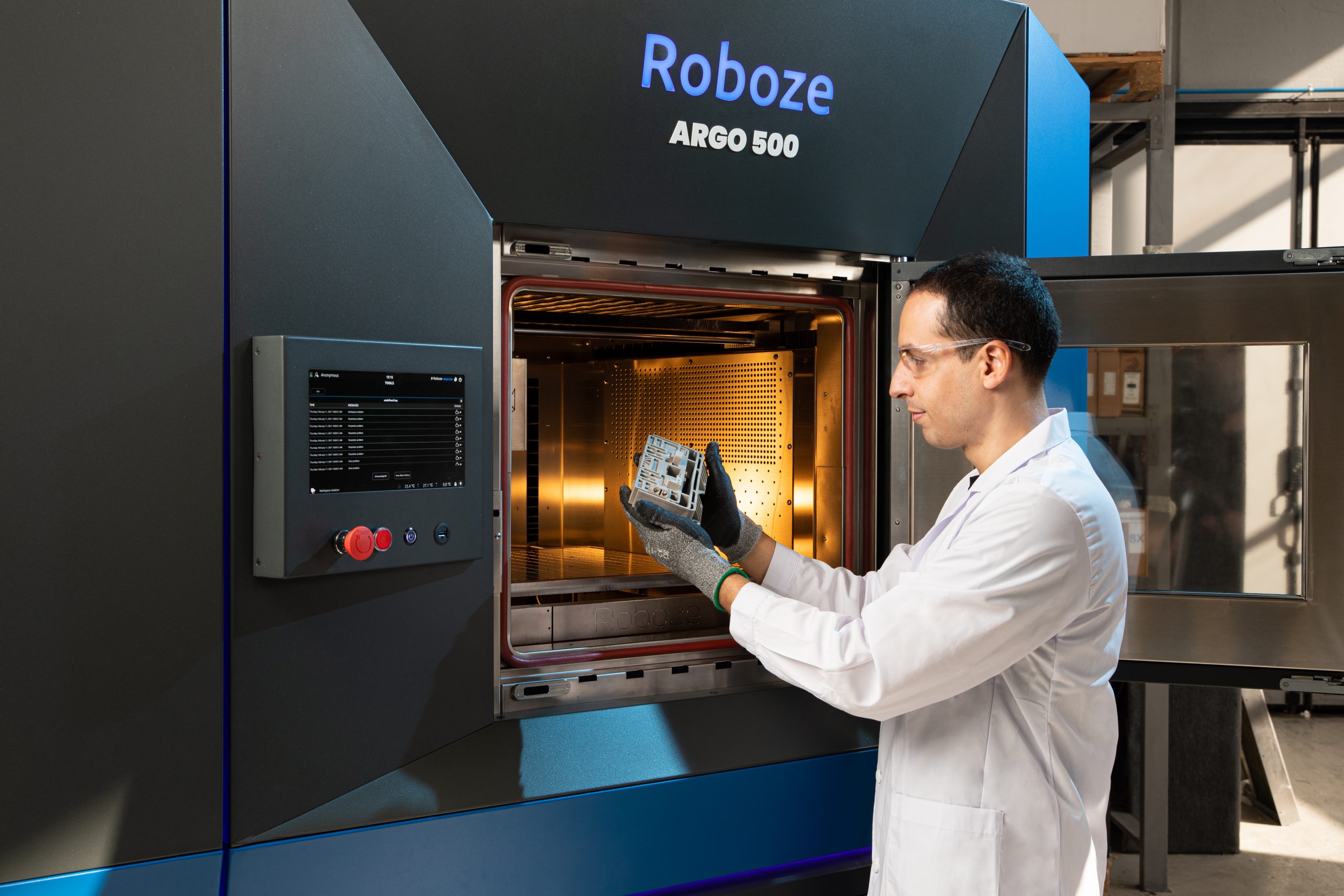Industrial manufacturing firm Siemens and industrial-grade 3D printer manufacturer Roboze have entered into a partnership to develop complete workflows for the industrialization of 3D printing.
The partnership will see the two firms combine their respective expertise to increase the production opportunities for companies operating within the energy, mobility, and aerospace sectors through a raft of digitalization and automation projects.
“We have embarked on a path that sees us leading the way with Roboze to increase the production capacities of manufacturing companies around the world,” said Tim Bell, Additive Manufacturing Business Manager at Siemens. “We have experienced the potential of Roboze’s 3D printing firsthand, so much so that we have chosen to implement their ARGO 500 into our processes.
“I’m excited to be a part of this project as I see ample strategic opportunities for the future of manufacturing.”

Roboze’s ARGO 500 and super-polymers
Launched at Formnext in 2017, the ARGO 500 is Roboze’s high-performance FFF machine specifically geared for the production of high-end finished 3D printed parts for the industrial, aerospace, and automotive sectors.
The machine’s high precision and reliability, even when fabricating parts made of super-polymers and composite materials, has seen it be deployed by numerous partners for a wide range of applications. For instance, the printer has been used by the University of Delaware to facilitate research of high-temperature composite 3D printing in partnership with the US Army.
Roboze has also developed its own range of ultra-rigid thermoplastics, called super-polymers, the latest of which was launched in February under the name Helios PEEK 2005. The ceramic fiber-reinforced filament joins the firm’s existing range of Carbon PEEK, Carbon PA, PEEK, and ULTEM AM9085F materials which continue to find new use cases.
For example, Roboze’s super-polymers have been leveraged for demanding end-use applications such as carbon fiber-filled PEEK aerospace parts by Italian defense contractor Leonardo, the University of Colorado Boulder’s new ultra-durable CubeSat, and optimized parts for the Ducati Lenovo MotoGP team’s Desmosedici GP motorbike.

Industrializing additive manufacturing
Siemens Digital Industries has long been at the forefront of paving the way toward automation and digitalization within industrial manufacturing, having entered into numerous partnerships with 3D printing firms to help them achieve greater productivity and flexibility. In 2020, the firm opened its Advance Manufacturing Transformation Center (AMTC) in Singapore to help its customers in the region transition into industrial 3D printing and Industry 4.0.
Elsewhere, post-processing specialist DyeMansion has integrated the firm’s automation technology into its Powerfuse S vapor polishing system, while German car manufacturer Volkswagen has entered into a software partnership with Siemens to increase the productivity of its binder jet manufacturing process. SLA 3D printer manufacturer Nexa3D has also previously equipped its Quantum Laser Sintering (QLS) systems with Siemens’ suite of enhanced automation software.
In its latest partnership, Siemens is combining its digitalization expertise with Roboze’s industrial 3D printing hardware and super-polymers offering to create complete workflows for industrial 3D printing. The workflows will be designed to increase the productivity, competitiveness and efficiency of manufacturing customers within the energy, mobility and aerospace sectors.
The two companies will embark upon multiple digitalization and automation projects to address current challenges to industrial additive manufacturing, and will also seek out new opportunities to generate success for customers in their pursuit of scalable digital manufacturing.
As part of the agreement, Siemens has installed a Roboxe ARGO 500 industrial 3D printer at its Charlotte Advanced Technology Collaboration Hub (CATCH) that it says will help to further industrialize additive manufacturing in the US.
“We are excited to announce our new partnership with Siemens, which actually represents another step in our strategy to be closer to the industries we have served for years, such as energy, mobility, and aerospace,” said Francesco Pantaleone, Vice President of Business Development at Roboze.
“For us, Siemens is an ideal partner to be even more present in these innovative sectors that want to start strategic digital transformation paths.”

Subscribe to the 3D Printing Industry newsletter for the latest news in additive manufacturing. You can also stay connected by following us on Twitter and liking us on Facebook.
Looking for a career in additive manufacturing? Visit 3D Printing Jobs for a selection of roles in the industry.
Subscribe to our YouTube channel for the latest 3D printing video shorts, reviews and webinar replays.
Featured image shows ROBOZE’s ARGO 500 (pictured) is increasingly being deployed to 3D print parts within more demanding applications. Photo via ROBOZE.


